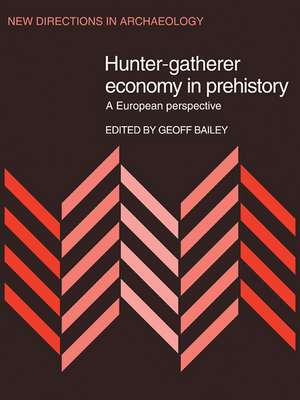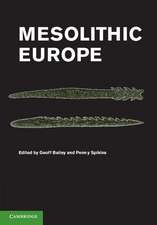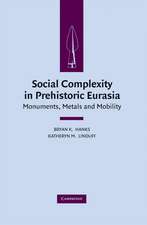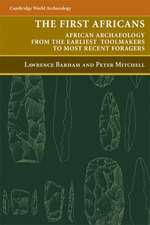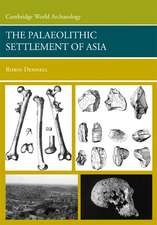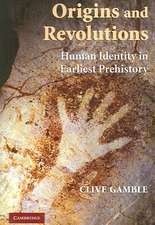Hunter-Gatherer Economy in Prehistory: A European Perspective: New Directions in Archaeology
Editat de Geoff Baileyen Limba Engleză Paperback – apr 2009
Din seria New Directions in Archaeology
-
 Preț: 237.68 lei
Preț: 237.68 lei -
 Preț: 391.19 lei
Preț: 391.19 lei -
 Preț: 325.50 lei
Preț: 325.50 lei -
 Preț: 291.30 lei
Preț: 291.30 lei -
 Preț: 392.18 lei
Preț: 392.18 lei -
 Preț: 287.56 lei
Preț: 287.56 lei -
 Preț: 391.19 lei
Preț: 391.19 lei -
 Preț: 284.39 lei
Preț: 284.39 lei -
 Preț: 308.34 lei
Preț: 308.34 lei -
 Preț: 407.42 lei
Preț: 407.42 lei -
 Preț: 382.89 lei
Preț: 382.89 lei -
 Preț: 389.84 lei
Preț: 389.84 lei -
 Preț: 288.04 lei
Preț: 288.04 lei -
 Preț: 322.62 lei
Preț: 322.62 lei -
 Preț: 313.85 lei
Preț: 313.85 lei -
 Preț: 284.56 lei
Preț: 284.56 lei -
 Preț: 285.54 lei
Preț: 285.54 lei -
 Preț: 288.62 lei
Preț: 288.62 lei -
 Preț: 282.10 lei
Preț: 282.10 lei -
 Preț: 282.10 lei
Preț: 282.10 lei -
 Preț: 285.16 lei
Preț: 285.16 lei -
 Preț: 284.17 lei
Preț: 284.17 lei -
 Preț: 285.93 lei
Preț: 285.93 lei -
 Preț: 284.56 lei
Preț: 284.56 lei -
 Preț: 287.87 lei
Preț: 287.87 lei -
 Preț: 287.48 lei
Preț: 287.48 lei -
 Preț: 205.53 lei
Preț: 205.53 lei -
 Preț: 285.16 lei
Preț: 285.16 lei -
 Preț: 284.98 lei
Preț: 284.98 lei -
 Preț: 285.16 lei
Preț: 285.16 lei -
 Preț: 285.16 lei
Preț: 285.16 lei -
 Preț: 283.79 lei
Preț: 283.79 lei -
 Preț: 284.56 lei
Preț: 284.56 lei -
 Preț: 282.26 lei
Preț: 282.26 lei -
 Preț: 285.37 lei
Preț: 285.37 lei -
 Preț: 286.13 lei
Preț: 286.13 lei -
 Preț: 297.58 lei
Preț: 297.58 lei
Preț: 293.42 lei
Nou
Puncte Express: 440
Preț estimativ în valută:
56.15€ • 60.97$ • 47.17£
56.15€ • 60.97$ • 47.17£
Carte tipărită la comandă
Livrare economică 22 aprilie-06 mai
Preluare comenzi: 021 569.72.76
Specificații
ISBN-13: 9780521106207
ISBN-10: 0521106206
Pagini: 256
Dimensiuni: 210 x 279 x 14 mm
Greutate: 0.59 kg
Editura: Cambridge University Press
Colecția Cambridge University Press
Seria New Directions in Archaeology
Locul publicării:Cambridge, United Kingdom
ISBN-10: 0521106206
Pagini: 256
Dimensiuni: 210 x 279 x 14 mm
Greutate: 0.59 kg
Editura: Cambridge University Press
Colecția Cambridge University Press
Seria New Directions in Archaeology
Locul publicării:Cambridge, United Kingdom
Cuprins
1. Hunter-gatherer behaviour in prehistory: problems and perspectives Geoff Bailey; Part I. Primary data sources: problems of theory and method: 2 Editorial; 3. Time budgeting and hunter-gatherer technology Robin Torrence; 4. Mortality models and the interpretation of horse population structure Marsha Levine; 5. The calculation and interpretation of ungulate age profiles from dental crown heights Richard G. Klein, Kathryn Allwarden and Cornelia Wolf; Part II. Spatial organization of the subsistence economy: 6. Editorial; 7. Epirus revisited: seasonality and inter-site variation in the Upper Palaeolithic of north-west Greece Geoff Bailey, Pat Carter, Clive Gamble and Helen Higgs; 8. Site variability and prehistoric economy in Levante Iain Davidson; 9. Boreal phase settlement/subsistence models for Cantabrian Spain Geoffrey A. Clark; 10 Sedentary hunters: the Ertebolle example Peter Rowley-Conway; Part III. Long-term economic change: demographic and environmental factors: 11. Editorial; 12. Late Pleistocene hunter-gatherer adaptations in Cantabrian Spain Geoffrey A. Clark and Lawrence G. Straus; 13. Economic change in Late Pleistocene Cantabria Geoff Bailey; 14. Further reflections on adaptive change in Cantabrian prehistory Lawrence G. Straus and Geoffrey A. Clark; 15. Late Pleistocene economies of the French Pyrenees Paul G. Bahn; Part IV. Social interaction and economic change: large-scale perspectives: 16. Editorial; 17. Social network systems amongst hunter-gatherers considered within southern Norway Marcie Madden; 18. Culture and society in the Upper Palaeolithic of Europe Clive Gamble; 19. Palaeolithic cave art in ecological perspective Michael A. Jochim; 20. Palaeolithic archaeology - some problems with form, space and time Martin Wobst.
Descriere
The study of hunters and gatherers has become an increasingly popular and central topic of research.
